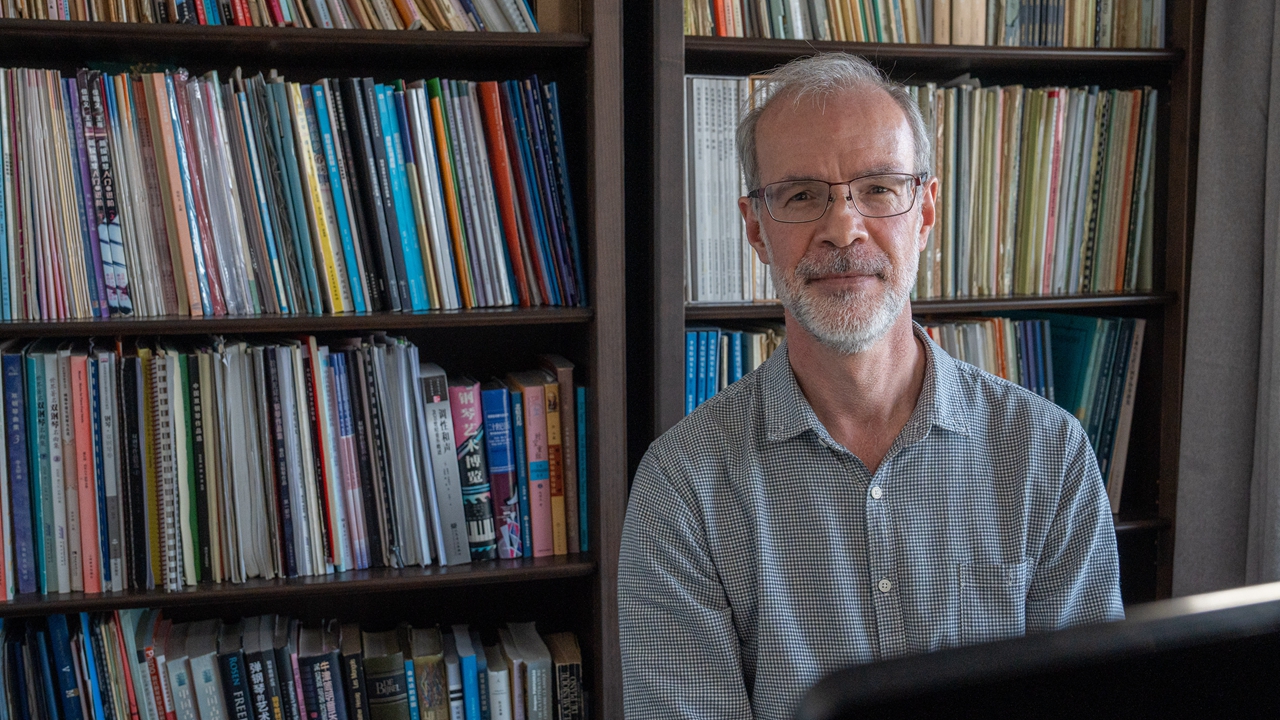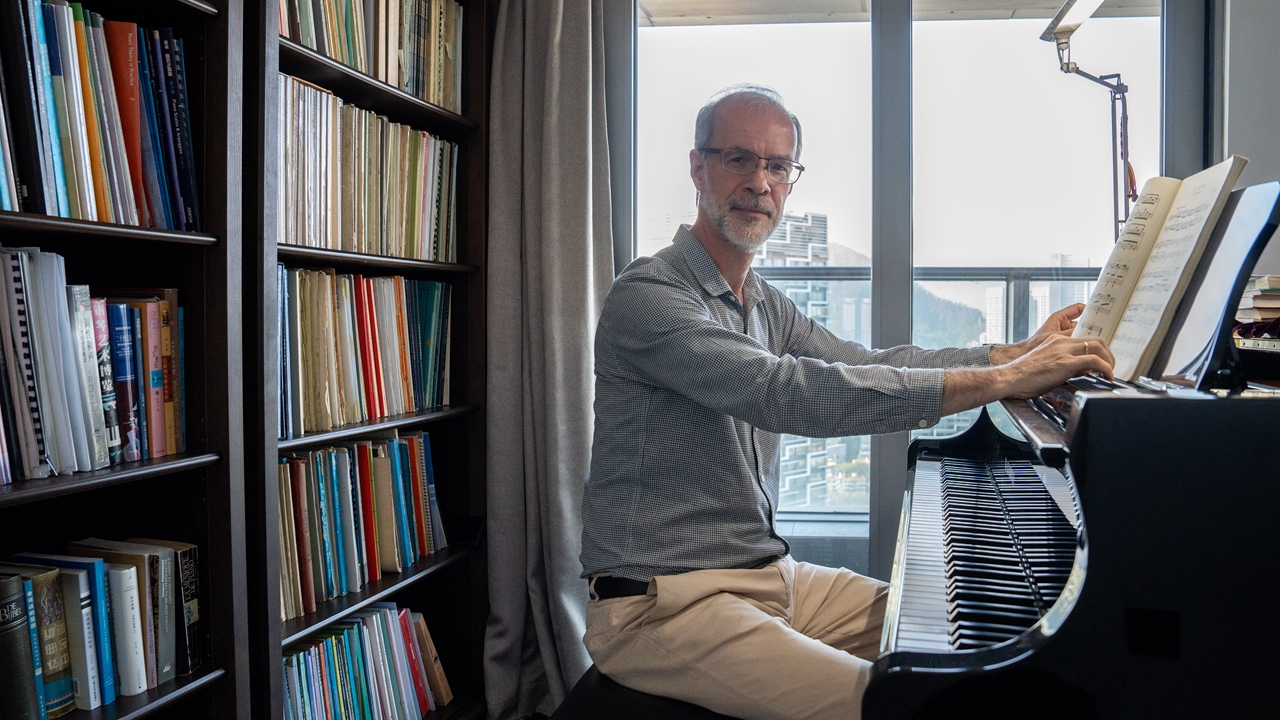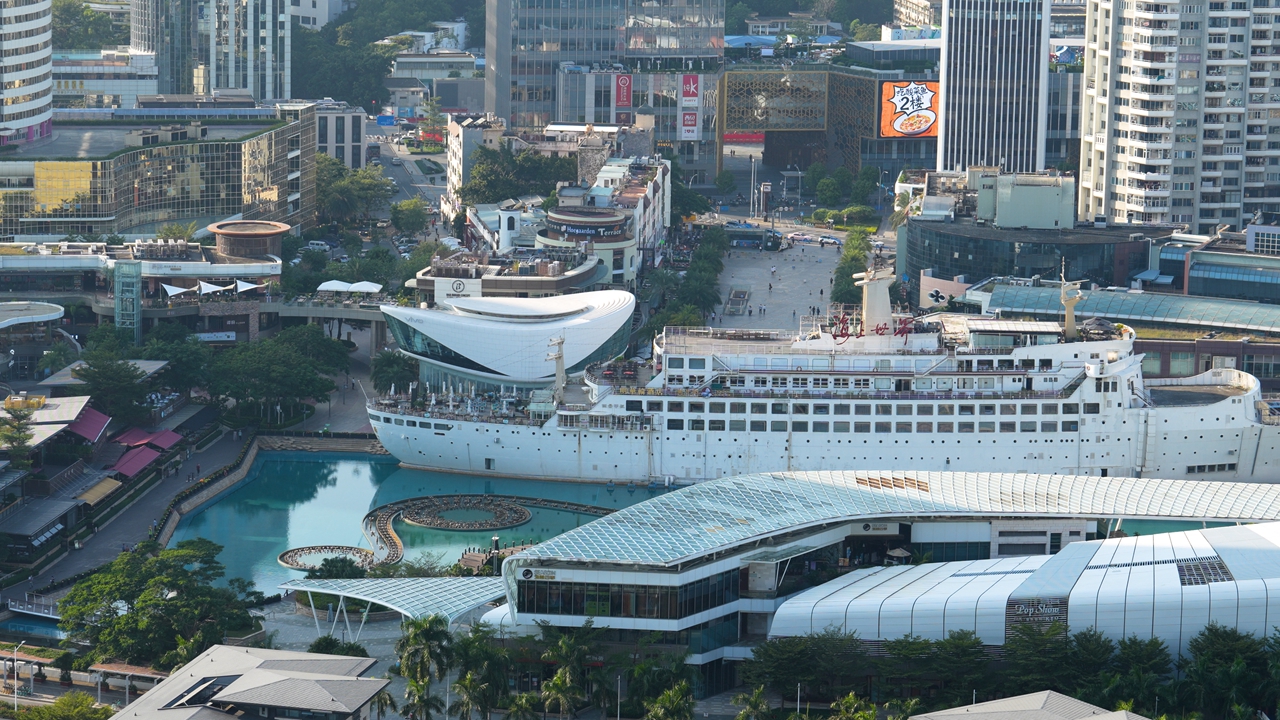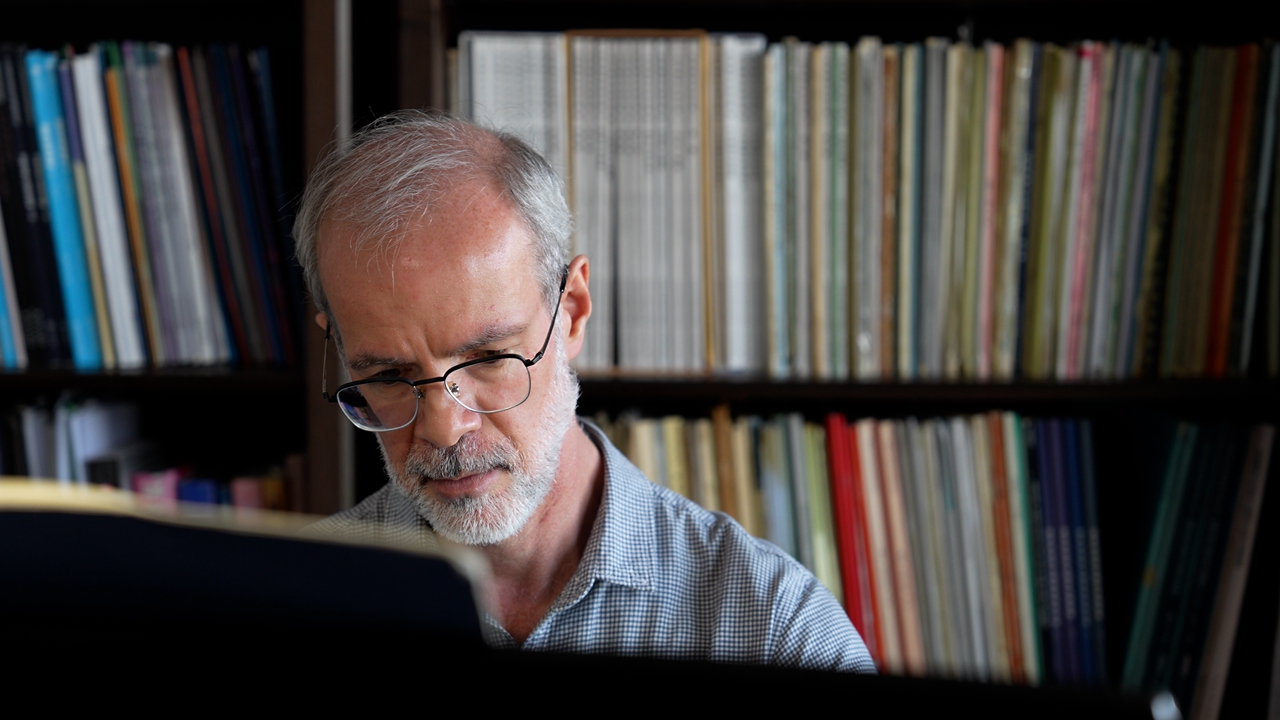Pianist compares city to 'Rite of Spring'
PROFILE
人物介绍
Renaat Beheydt, who graduated from the Queen Elisabeth Music Chapel in Belgium, teaches the piano at Xinghai Conservatory of Music in Guangzhou. He first arrived in Shenzhen in 2009 with his Chinese wife and now thinks himself a local of Shekou. He compares Shenzhen to Stravinsky’s “The Rite of Spring.”
博复生毕业于比利时伊丽莎白女王音乐学院,是星海音乐学院钢琴系副教授。2009年,博复生和他的华裔妻子来到深圳,现在他觉得自己是蛇口本地人。他把深圳比作斯特拉文斯基的《春之祭》。
比利时钢琴家将深圳比作《春之祭》
Video and photos by Lin Jianping, Wang Haolan 视频制作、摄影:林建平、王浩岚
When Renaat Beheydt first learned that he was to migrate to Shenzhen 13 years ago, his response was lukewarm, just like the original audience’s reaction to Stravinsky’s “The Rite of Spring.”
13年前,博复生得知自己将移居深圳一点也不激动,和首演观众对斯特拉文斯基的《春之祭》反应差不多。
His wife’s employer GSK wanted to build a plant in the city and sent his wife Zhu Peng, of Chinese origin, to oversee the whole process. His plan was to stay one or two years, and then go back to Belgium.
他妻子的雇主葛兰素史克想在这里建厂,派他的华裔妻子朱蓬监督整个过程。他原计划在深居住一两年就回比利时。

Renaat Beheydt at an interview with Shenzhen Daily at his home in Shekou, Nanshan District.
博复生在位于南山蛇口的家中接受英文《深圳日报》记者采访。
“We had visited many cities throughout China before, like Beijing, Shanghai, Xi’an and Luoyang. I really adore cities with a history. So I thought, well, Shenzhen, let’s see. I was pleasantly surprised to discover that I like living here.”
“我们之前到过中国很多城市,比如北京、上海、西安、洛阳。我喜欢有历史感的城市。我想,好吧,深圳,试试看。我惊喜地发现我喜欢这里的生活。”
The planned sabbatical was extended with Zhu's renewed job contract, and Beheydt himself started to take in students. A graduate of the Queen Elisabeth Music Chapel, he had worked as a piano teacher back in his hometown. He also holds a master’s degree in Chinese language, which makes it easier to integrate into local life.
原定的短期逗留因为朱蓬续签工作合约变成了长期居住,博复生也开始教学生。他毕业于伊丽莎白女王音乐学院,曾在家乡比利时担任钢琴老师。他还拥有汉语硕士学位,这让他更容易融入本地生活。
Beheydt said young vibrant Shenzhen immediately made him think of “The Rite of Spring.” “This piece was not very well accepted when it was first performed so people were shouting in the hall, because it was too modern and they couldn’t understand it. But gradually it began to be considered one of the masterpieces of the 20th century.
博复生说,年轻充满活力的深圳立即让他想到《春之祭》。“这首曲子首演时不受欢迎,人们甚至喊出抗议,因为作品太现代了,让人无法理解。但渐渐地,人们接受它是20世纪音乐的杰作之一。”

A view of lush greenery and buildings in Shekou from the balcony of Beheydt's home.
从博复生家阳台眺望,可以看到蛇口的众多建筑和郁郁葱葱的草木。
The unstoppable energy that characterizes both “Rite of Spring” and Shenzhen is evident, he said. Standing on his balcony, he explained that Wanghai Road below was just fields and earthen roads when he arrived in Shekou. Now the area is a nice community with housing estates, restaurants, shops and a cultural center. The only two lines of Metro have also grown into an elaborate system to cover the whole city, he added.
博复生说,正如《春之祭》,深圳势不可挡的动能显而易见。他站在阳台上,回忆起刚到蛇口时,楼下的望海路还是田野和泥路。现在,这是一个不错的社区,有住宅、餐馆、商店和文化中心。地铁网络也由当初仅有的两条线路发展到覆盖城市的各个角落。
Splitting time between his teaching job at the Xinghai Conservatory of Music in Guangzhou and practicing and tutoring students in his home in Shekou, Beheydt tries to be part of the city, not as a foreigner, but just as a human being. “I come here, and I feel I must adapt, and I also feel I can contribute something to the society,” he said.
博复生在广州星海音乐学院教书,没课时就在蛇口的家中练琴、辅导学生。他努力成为这座城市的一员,不把自己当外国人。“我来到这里,就必须适应,我也可以为社会做贡献,”他说。
He is amazed that there are facilities for culture in almost all the districts, especially in recent years – there’s a big theater even in Pingshan, which was once thought as a “remote” part of Shenzhen with clusters of factories.
令他惊讶的是,深圳几乎所有区都有文化设施,近年来数量增加尤其明显。甚至在曾经被认为是深圳的“偏远”地区,工厂众多的坪山区也有大剧院。

Beheydt shares with Shenzhen Daily readers his views on Shenzhen's cultural events and cultural facilites.
博复生和记者分享他对深圳文化活动和文化设施的印象。
“It’s really a wonderful thing that the offering is immense in concerts and performances. If you want, you could go to a concert almost every day prior to the pandemic,” he said.
“这里有海量的音乐会和各种表演,真的很棒。只要你愿意,疫情之前几乎每天都能听到音乐会。”他说。
His favorite place would still be the Shenzhen Concert Hall in the city center. “The building itself is wonderful, the acoustics are very good, and it’s embedded (among other culture facilities) in the center of the town, opposite the library, next to a beautiful bookstore, and not far from the Shenzhen Museum.
他最喜欢的文化场馆是市中心的深圳音乐厅。“建筑本身很棒,音响效果非常好,它在市中心图书馆对面,旁边是一家漂亮的书店,离深圳博物馆也不远。

A view of Minghua Cruise in Shekou from the balcony of Beheydt's home.
从博复生家阳台眺望,可以看到明华轮。
“It’s a kind of statement of this city that says: Culture is really an important thing for us,” he added. That said, the piano teacher thinks there’s still a long way to go with culture, because Shenzhen doesn’t have a rich cultural tradition and the population is very young, whose top concern is perhaps to become well off.
“这就像城市的一个宣言:文化对我们很重要,”他补充说。话虽如此,他认为深圳的文化建设还有较长的路要走,因为这里的文化传统相对不是很丰富,市民非常年轻,他们的头等大事还是过上富裕的日子。
“They come to Shenzhen to make a good living; they earn money for themselves and for the education of their children. So maybe, concerts, museum visits, or cultural life is not essential,” he said. He observed that children, or music students, often made a big part of the audience members at most of the concerts he went to, even when the program was something difficult like the “Goldberg Variations.” “It’s fine that parents want their kids to be cultivated,” he said, adding that he hopes to see more adult fans at concerts.
“他们来深圳是为了过上好日子;他们为自己和孩子的教育赚钱。音乐会、参观博物馆或者其他文化生活不是必需品。”他说。他观察到,在自己听过的多数音乐会中,观众中儿童或音乐专业的学生往往占很大比例,即使节目是《哥德堡变奏曲》这样艰深的曲子。“父母希望孩子接受熏陶这很好,”他说,“但我希望在音乐会上看到更多成年粉丝。”
“So I think education is an important part in that, maybe more important than in Europe, where people already have a good acquaintance with the repertoire in general, and know the pieces which are going to be played.”
“所以音乐普及教育很重要,也许在这里比在欧洲更重要,那里的听众对古典音乐已经有所了解,对将要演奏的曲目也至少略知一二。”
He cited some good initiatives in promoting classical music in Shenzhen, like the Beautiful Sunday free concerts at Shenzhen Concert Hall, and hopes these kinds of initiatives can reach a larger audience. He himself has performed several times at the free concerts.
他列举了一些深圳推广古典音乐的好办法,例如深圳音乐厅的美丽星期天免费音乐会;他希望这些形式能吸引更多观众。而他本人也曾多次在免费音乐会上演出。

Beheydt plays a piano piece for Shenzhen Daily journalists at his home.
博复生为英文《深圳日报》记者弹奏钢琴曲。
Due to some special circumstances, Beheydt played a lot of music by Chu Wanghua, one of the composers behind the “Yellow River Piano Concerto.” But Chu is not the only Chinese composer he likes.
机缘巧合,博复生演奏了《黄河协奏曲》作曲之一储望华的大量作品。但储望华并不是他唯一欣赏的中国作曲家。
“The more I play, the more I listen, the more wonderful Chinese composers and pieces I discover,” he said.
“我演奏得越多,听得越多,就发现越来越多的优秀中国作曲家和作品,”他说。
“When I listen or play a Chinese piece, I like to hear these three things. I like to hear that this composer is part of his time, he being a Chinese, and also a lot of personality.”
“我听或者演奏中国作品时,期待这三点。我期待听到这位作曲家的时代性,他的中国文化背景,和他的个性。”
A devoted teacher, Beheydt is loved by his pupils.
博复生是一位敬业的老师,深受学生喜爱。

Beheydt gives a piano lesson to a student at his home.
博复生为一位学生讲授钢琴课。
“I’ve studied with Professor Beheydt for seven years now,” said a pupil who is now a freshman piano major at Toronto University. “I still remember once he pointed out to me that I had made the same mistake for a seventh time when I first became his student. Since then, I have put in more effort,” she recalled.
“我和博教授学习了七年了,”他的一名学生说,她在多伦多大学钢琴专业读大一。“我还记得,那时候我刚跟他学琴,有一次他指出我已经第七次犯同样的错误了。从那以后,我更加努力,“她回忆道。
The Belgian is also impressed by the diligence of his Chinese students.
博复生也赞扬中国学生的勤奋。
“Some of them are musically talented,” he said. “Only by artistic intuition, without the cultural background, they can play very well.”
“他们有些人有很好的音乐天赋,”他说。“只凭艺术直觉,没有任何文化背景,他们也能弹得非常好。”
He is also aware of Shenzhen’s piano fever.
他也知道深圳有股钢琴热。
“The city has produced a large number of important pianists, especially from professor Dan Zhaoyi at Shenzhen Art School, who contributed a lot to Chinese piano music. Without Shenzhen, it would be very different,” he said.
“这座城市培养了一大批重要的钢琴家,特别是深圳艺术学校的但昭义教授,他为中国钢琴音乐做出了很大贡献。如果没有深圳,这一切会不一样,“他说。